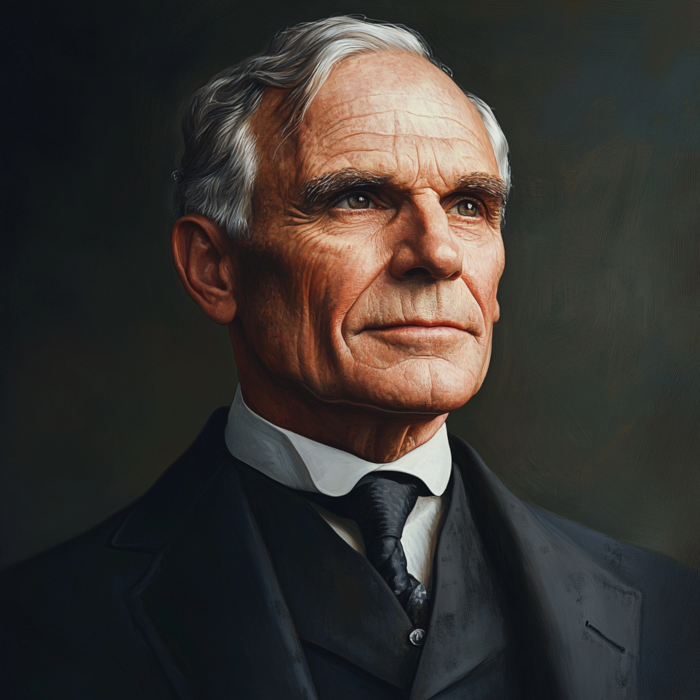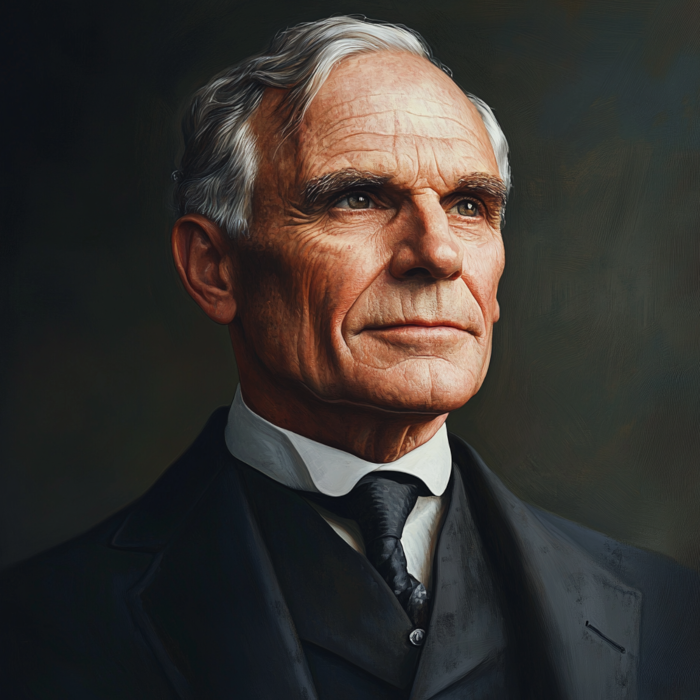


Henry Ford (1863–1947) was an American industrialist, business magnate, and founder of the Ford Motor Company. He is best known for revolutionizing the automobile industry and transforming manufacturing practices through the introduction of the moving assembly line. Ford's innovations not only made cars affordable for the average American but also had a profound impact on industrial production worldwide. His influence extended beyond the automotive industry, shaping modern consumer culture and labor practices.
Birth and Family: Henry Ford was born on July 30, 1863, on a farm in Greenfield Township, Michigan, near Detroit. He was the eldest of six children born to William Ford, an immigrant from Ireland, and Mary Litogot Ford, who was of Belgian descent. Ford showed an early interest in mechanics, preferring to work with machines rather than farm chores.
Early Interest in Mechanics: Ford's fascination with machinery began at a young age. He was particularly interested in watches and clocks, and by the time he was a teenager, he was already known as a skilled watch repairman. This early mechanical aptitude laid the foundation for his later career in engineering and manufacturing.
Education and Apprenticeship: Ford attended a one-room schoolhouse but left at the age of 16 to work as an apprentice machinist in Detroit. He worked for several different companies, including the Detroit Dry Dock Company, where he honed his skills in machine work and learned about steam engines and other industrial machinery.
Work at Edison Illuminating Company: In 1891, Ford took a job as an engineer with the Edison Illuminating Company in Detroit. He quickly rose through the ranks and was promoted to chief engineer in 1893. This position provided him with the financial stability and the time to pursue his interest in automobiles. Ford admired Thomas Edison, and the two became friends; Edison's encouragement played a significant role in Ford's decision to focus on developing a gasoline-powered car.
Quadricycle and Early Automobiles: In 1896, Ford completed his first experimental automobile, the Quadricycle. It was a simple, four-wheeled vehicle powered by a gasoline engine. The success of the Quadricycle inspired Ford to continue refining his designs, and he began seeking investors to support the development of a commercially viable automobile.
Founding of the Detroit Automobile Company: In 1899, with the backing of investors, Ford founded the Detroit Automobile Company. However, the venture failed within two years due to the high cost of production and the vehicles' lack of reliability. Ford learned valuable lessons from this experience, particularly the importance of producing affordable, durable vehicles.
Ford Motor Company: Undeterred by his earlier failures, Ford partnered with a group of investors to establish the Ford Motor Company in 1903. The company quickly began producing automobiles, with the Model A as its first offering. Ford's goal was to create a car that was affordable, reliable, and easy to maintain, which he believed would appeal to a mass market.
The Model T (1908): In 1908, Ford introduced the Model T, a car that would become one of the most famous and influential automobiles in history. The Model T was affordable, durable, and versatile, making it accessible to a broad range of consumers. Priced initially at $850, the cost of the Model T continued to drop as production methods improved, eventually falling to $300 by the 1920s. The Model T's success revolutionized transportation in America and made car ownership a reality for millions of people.
Introduction of the Assembly Line (1913): One of Henry Ford's most significant contributions to industrial production was the introduction of the moving assembly line in 1913. Inspired by the production techniques used in other industries, Ford implemented a conveyor system that moved parts from one worker to the next, with each worker performing a specific task. This innovation dramatically increased the efficiency of production, reducing the time required to assemble a car from more than 12 hours to just 93 minutes.
Impact on Manufacturing: The assembly line not only revolutionized automobile production but also transformed manufacturing practices across various industries. By standardizing parts and processes, Ford was able to achieve economies of scale, reducing costs and making products more affordable. The principles of mass production pioneered by Ford became the foundation of modern industrial manufacturing.
Five-Dollar Day (1914): In 1914, Ford made headlines by announcing that he would double the wages of his workers to $5 per day, a move that was both generous and strategic. The wage increase attracted skilled workers, reduced turnover, and increased productivity. It also allowed workers to afford the cars they were producing, thus expanding the market for Ford vehicles. This decision was a key example of Ford's belief in paying workers well to ensure loyalty and efficiency, a philosophy that became known as "Fordism."
Impact on Labor Relations: Ford's wage policies had a significant impact on labor relations and set a new standard for industrial wages. While his practices were innovative, Ford was also known for his strict management style, including the use of the Ford Sociological Department to monitor workers' behavior both on and off the job. This paternalistic approach aimed to ensure that workers adhered to the company's standards of conduct, but it also led to criticism and tension with labor unions.
Expansion and Influence: Throughout the 1920s and 1930s, Ford continued to expand his company and influence the automotive industry. However, the company's dominance began to wane as competitors like General Motors introduced more stylish and technologically advanced cars. Ford's reluctance to innovate beyond the Model T led to a decline in market share until the company introduced the Model A in 1927.
Social and Political Views: Ford was also known for his controversial social and political views. He was a vocal advocate of pacifism during World War I, and he used his wealth to promote various causes, including the publication of anti-Semitic articles in his newspaper, The Dearborn Independent. These articles were later compiled into a book titled The International Jew, which has been widely condemned for its inflammatory content. Ford eventually apologized for the articles and closed the newspaper, but the damage to his reputation was significant.
World War II and the Arsenal of Democracy: During World War II, Ford Motor Company became a key player in the American war effort, producing military vehicles, aircraft, and other equipment. Ford himself, despite his earlier pacifism, supported the war effort and helped transform the company's production facilities to meet the demands of wartime manufacturing.
Death: Henry Ford died on April 7, 1947, at the age of 83, at his estate, Fair Lane, in Dearborn, Michigan. His death marked the end of an era in American industry, but his legacy lived on through the company he founded and the profound impact he had on manufacturing, labor relations, and consumer culture.
Industrial Impact: Henry Ford's contributions to the automobile industry and manufacturing are immeasurable. He is credited with creating the first truly mass-produced automobile and revolutionizing industrial production with the assembly line. His innovations made cars affordable for the average person and helped create the modern consumer economy.
Cultural Influence: Ford's impact extended beyond industry; he helped shape the modern American way of life. The Model T not only provided affordable transportation but also symbolized freedom and mobility, changing the landscape of American cities and rural areas alike. Ford's ideas about labor and wages also influenced social policies and the development of the American middle class.
Controversy: Despite his many achievements, Ford's legacy is also marked by controversy, particularly his anti-Semitic writings and his complex relationship with labor. These aspects of his life have led to ongoing debates about how to reconcile his contributions to industry with the more troubling aspects of his personal beliefs and actions.
Henry Ford was a pioneering industrialist whose innovations in manufacturing and mass production transformed the automobile industry and had a lasting impact on the global economy. His vision of affordable cars for the masses helped shape the modern world, and his influence continues to be felt in the way products are manufactured and consumed today. While his legacy is complex, encompassing both groundbreaking achievements and significant controversies, Ford remains a towering figure in the history of industry and innovation.

We use cookies
We use cookies and other tracking technologies to improve your browsing experience on our website, to show you personalized content and targeted ads, to analyze our website traffic, and to understand where our visitors are coming from. Privacy Policy.